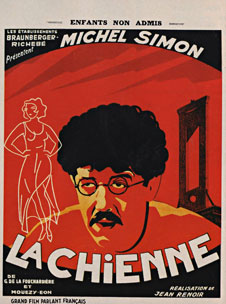LA CHIENNE
North American Premiere (Restored version) • Drama • France, 1931
DCP • 1.33 • mono • B&W • 91 min
Directed by: Jean Renoir
Written by: André Girard, Jean Renoir
Cinematography: Théodore Sparkuhl, Roger Hubert
Film Editing: Marguerite Houllé-Renoir, Paul Fejos, Jean Renoir, Denise Tual
Produced by: Pierre Braunberger (Les Films du Jeudi), Roger Richebé (Les Etablissement Braunberger-Richebé)
Cast: Michel Simon (Maurice Legrand), Janie Marèse (Lucienne 'Lulu' Pelletier), Georges Flamant (Andre), Magdeleine Bérubet (Adèle), Roger Gaillard (Alexis), Jean Gehret (Dugodet)
International Sales: Wide
US Distributor: Janus Film • janusfilms.com
The Franco-American Cultural Fund (FACF), Janus Films, La Cinémathèque Française and Les Films du Jeudi present, for the first time in North America, a new digitally restored version of Jean Renoir’s only foray into pulp thriller. La Chienne is the tale of the degradation, victimization, and ultimate liberation of one Maurice Legrand, a mousy, middle-aged bank accountant who manages a double life – with deadly consequences. Henpecked at home by his overbearing wife, Maurice retreats into his painting hobby whenever he can. As chance would have it, he meets Lulu, a charming but street-smart femme fatal, and quickly falls for her. Believing her to be the love of his life, Maurice sets her up in an apartment ostensibly used to store his paintings, without realizing that Lulu is in fact a streetwalker in love with Dédé, her abusive pimp. It’s a cushy gig for Lulu, but the loathsome Dédé wants more, and figures out a way to put all those paintings to better use.
In 1930 French cinema was reeling from an influx of Hollywood “talkies”. Young Jean Renoir was not yet the legendary writer/director he would become, but he was quick to adopt and adapt to the new technology of synchronized sound. The success of his talking short On purge bébé (1931), gave him the freedom to make his first real masterpiece, La Chienne, co-written with Andrè Girard. With its theme of anarchy destabilizing a seemingly ordered bourgeoisie world, the film set a template for a string of masterworks in the coming decade, including La Grande Illusion (1937), La Bête humaine (1938) and of course, Rules of the Game (1939), which so inflamed the French bourgeoisie that the film was quickly shelved, only to be recognized as a monumental classic in the 1960’s. Based on the novel by Georges de la Fouchardière, La Chienne was remade as Scarlet Street, by Fritz Lang in 1945, but where Lang’s film is moody and obsessive, Renoir’s is layered, ironic and more unsettlingly raw. The film received some unwelcome publicity when just two weeks after principal photography ended, the young Lulu, Janie Marèse, was killed in a car accident while her costar Georges Flamant – a man Renoir cast for his alleged first hand knowledge of criminal behavior – was at the wheel. Michel Simon, who played Maurice, had fallen in love with her and never forgave Renoir.
Quotes:
“…hugely influential, not only in France, where it spawned poetic realism and early attempts at neo-realism, but also in America, laying the foundation for what we now know as classic film noir.”
– James Travers FRENCH FILM SITE
“All of the performances are close to flawless, but it's Renoir's unseen presence one remembers most vividly.”
– Vincent Canby NEW YORK TIMES






